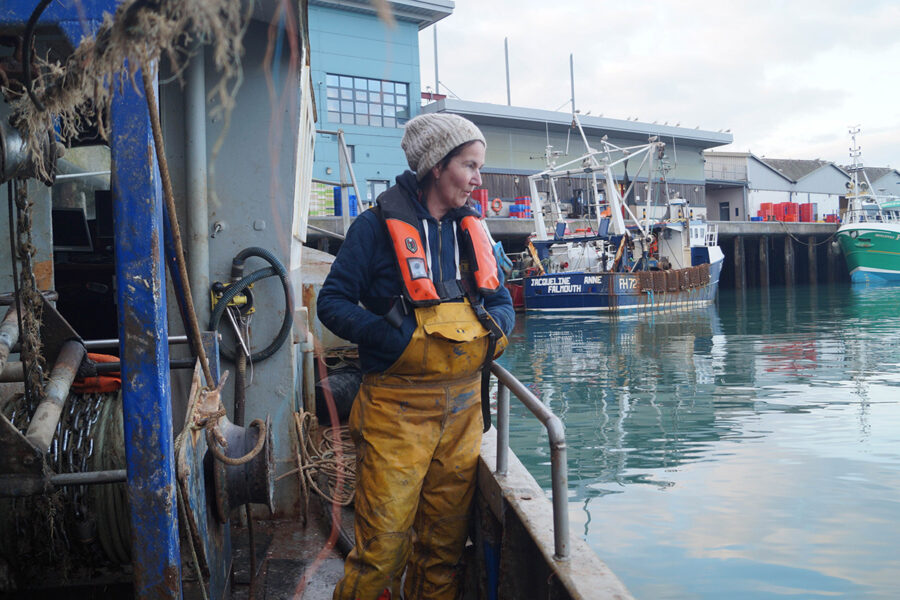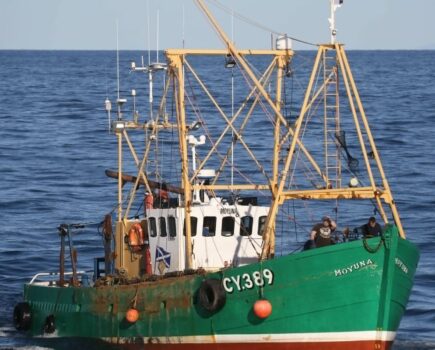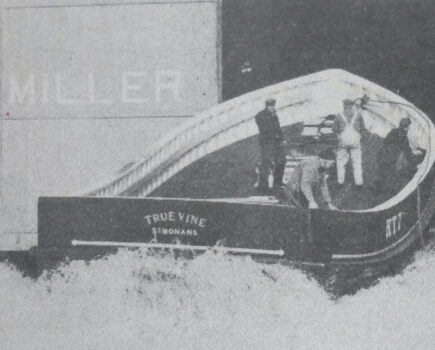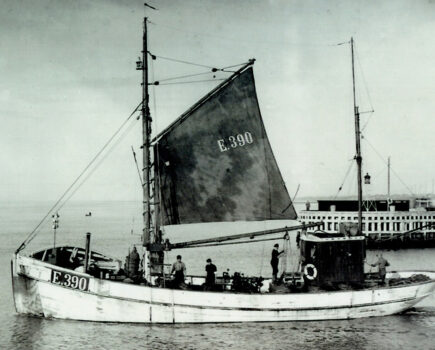Sarah Ready of NUTFA reflects on the overturned Devon & Servern IFCA case and the need to review other historic cases based on VMS data
Devon and Severn IFCA has rightly been excoriated in Plymouth Crown Court for blindly continuing to prosecute a hopeless case against the skipper and owner of the Stella Maris. It has been a rollercoaster three and a half years assisting vessel owner Jack Baker in respect of his appeal against the convictions brought by D&SIFCA against each appellant.
I became involved in the case in May 2019, after the D&SIFCA served yet another hefty legal bundle to go with the already weighty charts, statements and multiple expert witness bundle. It was at this point I started to assist Jack, more latterly through the New Under Ten Fishermen’s Association (NUTFA), once the LawWorks pro bono law clinic was up and running.
In the last three years I have written to the Crown Prosecution Service, the then attorney general, the secretary of state, Defra and the MMO, asking for external intervention, and of course to D&SIFCA, asking for a review, none of which brought any sensible intervention.
The case had grown out of control, and would have needed at least six days in court to resolve. The chances of getting court time were hampered by Covid and a backlog of other court cases that had built up due to strikes. It became clear after the skipper’s illness fluctuated and worsened that it was only through an abbreviated one-day abuse of process application that a hearing could be had which would stop this procedural nonsense.
Application was made in respect of a court decision on the lawfulness of using solely vessel monitoring systems as evidence, without corroboration. This stood alongside the main issues of whether it is right to prosecute an ill man, and whether an owner is strictly jointly liable alongside an errant skipper.
Following the Meredith case acquittals on VMS alone, which the D&SIFCA had cited as a ‘guinea pig’ case and a reason to delay Jack’s case by 12 months, the finding by the court on 4 October that D&SIFCA was in the wrong to continue to prosecute must act as a timely reminder that no IFCA can operate in isolation

The owner and skipper of the Stella Maris were convicted of multiple instances of illegal fishing within the Start Point to Plymouth Sound and Eddystone SAC, on the basis of VMS evidence alone. (Photo: Martin Johns)
, much as a rogue elephant operating outside the ‘IFCA herd’ might do, causing harm and mayhem along the way.
After asking the fishing industry to provide details of their own VMS and D&SIFCA experiences to me, it became very apparent that this case was far from unique. There have been a large number of hidden VMS evidence-only investigations, and then prosecutions, without any previous contact to either owner or skipper, with the net effect of stacking up costs.
This ground down some fishermen, who then pleaded guilty or took financial penalties simply in order to get proceedings over with, and get on with their fishing. The process is unedifying, and appears to ignore D&SIFCA policies and guidelines on using the ‘softly softly’ approach first, and enforcement as a last option.
Inshore fishermen do not have a bottomless pit of money to engage lawyers and experts, and all feel they are left having to prove their innocence, instead of the burden being on the prosecution to prove guilt.
Wearing many hats that flow across female fishermen, family fishing business director and boat owner, together with running the NUTFA LawWorks law clinic, my fishing experience over many years has been vital to understand the complexities of the regulatory issues on a practical day to day level in this case.
There is something wrong and retrograde in the Marine and Coastal Act 2009, when it provides that MMO cases obtain an independent review before prosecution, and yet IFCAs all have their own privately contracted solicitors, who both review the evidence and advise on a prosecution. The potential for a less than transparent appearance to the public, and possible conflicts of interest, are there, and this too can generate a feeling of suspicion and resentment amongst fishermen.
Although it was not the main reason for deciding the case was an abuse of court process, His Honour Judge (HHJ) Linford stated that he could see no public interest in prosecuting the skipper or the owner if the result would be, for legal reasons, an absolute discharge for both men.
Indeed, even though prosecution delay in the magistrates’ court was not sufficient on its own to found an abuse argument, it did not help D&SIFCA that on the day of the hearing, the prosecuting authority sought to introduce its own inadequate medical evidence, which was served way too late in the process, and which added another nine unnecessary months before the hearing was heard.
Perhaps if costs did not come out of central funds, but rather from D&SIFCA’s own reserve of funds, there might have been pause for thought before such litigation was pursued to the bitter end, regardless of the way D&SIFCA money was spent, or the effect it had on the appellants.
HHJ Linford was also very clear that VMS ‘can only ever show a vessel’s position, heading and speed, which is not of itself sufficient to prove to a criminal standard that a vessel was fishing’. He stated: “It is that conclusion from simply VMS evidence that is objectionable and that is why, no doubt, the minister said what he did.” This refers to a letter that then fisheries minister Robert Goodwill wrote to me on 24 July, 2019, which was provided to the court. D&SIFCA was in copy of this letter.
HHJ Linford was particularly critical of the magistrates in proceeding to try the skipper in his absence after having received medical evidence that he was too mentally unwell to attend trial. This fatal error aggravated the case, adding four further years of tortuous litigation that exacerbated the mental health of the skipper, and contributed to the poor health of both the owner and his wife. HHJ Linford found the medical report obtained by the prosecuting authority inadequate, after it had been served out of time.
There is still much to do as a result of this case. We are pushing for a national standard for IFCAs (if indeed they are allowed to continue to govern the inshore area), and a fight for a review in respect of the cases that have gone before, that have been based entirely on VMS data and its interpretation. Many of these failed to meet the standard of proof required within a criminal trial.
The difficulty fishermen face in the magistrates’ court is that magistrates are unlikely to consider fishermen as the true experts when faced with technical VMS-based reports on ‘fishing’. Many fishermen have told me it is a waste of time trying to defend in a magistrates’ court, because magistrates are unwilling to consider any challenge to evidence given by an officer in uniform, who bamboozles the court with supposed expert evidence, when all that is in fact going on is an opinion based on inference.
We are pressing ahead with a request for a full public review of the cases that have been presided upon since the inception of D&SIFCA in 2011.
NUTFA has just over 50 historic sets of papers from fishermen, but would very much welcome contact from other fishermen who have been within the criminal justice system, or in respect of a Financial Administrative Penalty, particularly if you have been prosecuted by D&SIFCA or Cornwall IFCA.
We are collating our own report, and hope to have this concluded in early 2023. Time is therefore marching on, and I would welcome contact from any other fishermen who have not yet come forward, even if you have pleaded guilty to the offences due to the fear of spiralling costs.
We need change, and we need it now. I read with interest the thesis of Max Dixon entitled ‘UK fisheries: Trust and governance in post-Brexit Britain’ (Fishing News, 15 September, ‘We don’t trust you! Research reveals breakdown in relations between fishermen and regulators’). Is it any wonder that trust has broken down to such an extent between regulators and fishermen when you have a regulating authority that is engaging in enforcement in this way?
I hope that this case is a catalyst for change, and that D&SIFCA recognises that there are very serious failings within the way that it manages the inshore. Sadly, I anticipate that the only way that there will be a positive way forward in Devon is a change in personnel at the top of both the operational staff and the committee.
This story was taken from the archives of Fishing News. For more up-to-date and in-depth reports on the UK and Irish commercial fishing sector, subscribe to Fishing News here or buy the latest single issue for just £3.30 here.








